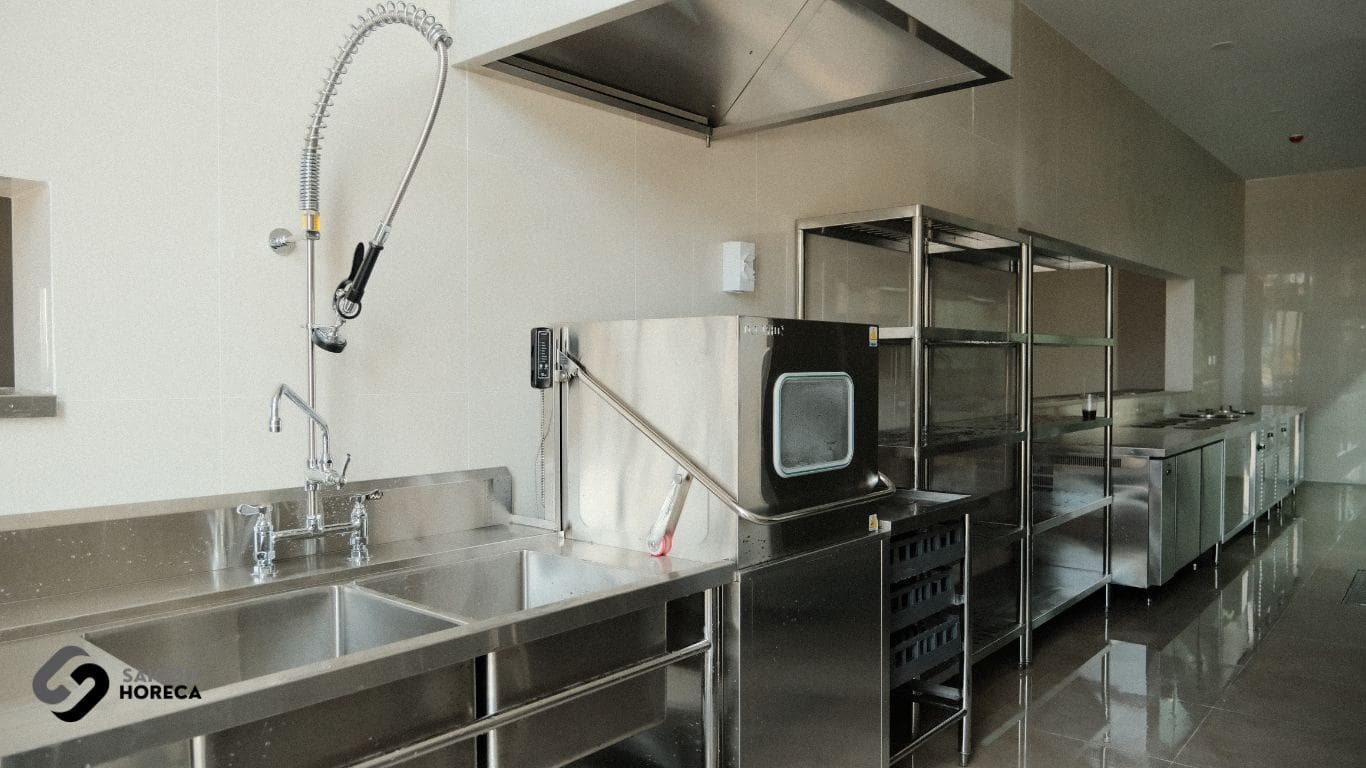In the context of the rapidly growing culinary and food service industry, investing in industrial kitchen equipment for a canteen […]
Read more
- News
Instructions for choosing to buy an industrial dishwasher
- April 30, 2025
If you’ve ever had a headache because the mountains and dishes are flooded after rush hour or cost a lot of dishwasher labor, you’ve definitely thought about investing in an industrial dishwasher. In particular, in the restaurant and hotel business, quick, effective and hygienic handling of dishes is an indispensable factor to maintain stable operations.
But the problem is, there are too many types of industrial dishwashers on the market with all styles, functions, and prices. How to choose a machine that is both suitable for your needs and worth the money? Don’t worry, in this article, Saigon Horeca will help you resolve all your concerns and choose the best solution for your kitchen.
In this Article
Benefits of industrial dishwashers
Outstanding benefits that industrial dishwashers bring:
1. Saves time and manpower
Instead of spending hours and hours washing dishes, industrial dishwashers take just a few minutes to process huge quantities. Not only will your employees be less hard-working, but it will also free up time for them to focus on more important tasks, like serving customers or preparing food.
2. Ensure food hygiene and safety
The machine’s hot water washing system and state-of-the-art technology thoroughly remove bacteria and grease. This is especially important in compliance with strict hygiene standards. Both clean and safe, no longer concerned about stubborn “stains or the risk of losing points with customers.
3. Long-term cost savings
Although the initial cost seems to be “expensive”, using a dishwasher is a smart investment. You will save significantly on water, electricity and chemicals compared to washing your hands. Furthermore, machines always work stably, no need for overtime or vacation!
4. Environmentally friendly
Today, many modern machines are designed to save energy and minimize water use. Both save costs and minimize negative impacts on the environment – is exactly the “green” standard that businesses are aiming for.
>>> Let’s learn how industrial cup washing machines work?
Classify industrial dishwashers by capacity
Classified according to the capacity of the dishwasher
When choosing an industrial dishwasher, capacity is the most important factor. Based on usage needs, dishwashers are divided into two main types: small capacity machines and large capacity machines. Below are detailed characteristics to help you make the right choice.
1. Small capacity industrial dishwasher
This type of machine usually has a capacity ranging from 30 – 60 rack/hour, which meets the needs of small and medium sized restaurants and eateries well. With its compact design, the machine does not take up too much space, making it ideal for limited kitchen spaces.
Don’t let the word “small” make you doubt the performance! Small capacity dishwashers still impress with their ability to handle from 1000 – to 1500 dishes per hour. This helps ensure dishes are always ready to serve, especially during peak hours. With this type of machine, you can both save space and optimize operating efficiency without needing too much manpower.
2. Large capacity industrial dishwasher
If you run large-scale kitchens such as in industrial parks, hospitals, or factories, large-capacity dishwashers will be an indispensable choice. With processing capabilities from 100 – 1000 rack/hour, these machines are designed to face huge volumes of dishes and other bulky cooking utensils.
However, along with the impressive capacity of the huge “size,” requires ample kitchen space for efficient operation. But in return, you can rest assured that everything will always be clean and ready, even in the most stressful kitchen environment.
Classify industrial dishwashers according to structure
Choosing an industrial dishwasher is not only based on capacity but also depends on the structure and operation method. Below are three popular types of machines, each providing its own advantages to suit each need.
1. Front door dishwasher
This is a line of compactly designed dishwashers with a single front door, capable of cleaning from 20 – 55 rack/hour. The machine has a similar appearance to home dishwashers but is equipped with many modern features, optimizing cleaning efficiency in a professional environment.
Thanks to its compact size, this machine is easily arranged under the bar or in limited spaces such as small bars or even home kitchens. The convenience and versatility of the front door machine makes it a popular choice for facilities with moderate washing needs while still ensuring professionalism.
2. Top door dishwasher
The upper door dishwasher is the perfect choice for restaurants or medium-sized industrial kitchens. With the ability to handle 30 – 350 racks/day, this machine is intelligently designed to support a closed process, helping to optimize workflow between clean and dirty bowl areas.
The operation mechanism is quite simple but effective: after being pre-coated, dishes will be brought into the machine through the upper door. After completing the washing cycle, they are removed and sorted into the clean bowl area. This is a more compact version of the conveyor dishwasher, but still fully meets the needs of restaurants and hotels with moderate amounts of dishes.
3. Conveyor dishwasher
When it is necessary to handle large volumes of dishes in a short time, a conveyor dishwasher is an indispensable solution. With washing capacity from 350 to 1000 racks/day, this is the machine with the largest capacity among industrial machines.
Designed for fully automatic operation, the conveyor dishwasher ensures everything from rinsing to washing to drying happens quickly and accurately. However, due to its large size and large space requirements, this type of machine is usually only suitable for large kitchens in restaurants, hotels or areas serving hundreds of meals per day.
Outstanding benefits of industrial dishwashers
In the culinary business, operating efficiency and cost optimization are always top priorities. Industrial dishwashers not only help reduce the labor burden but also bring many practical benefits, from saving costs to ensuring food hygiene and safety standards.
1. Save electricity, water and labor costs
One of the biggest benefits of industrial dishwashers is the ability to optimize operating costs. Compared to hiring workers to wash by hand, dishwashers save significant time and resources.
Try a simple calculation:
- For a large industrial kitchen, usually 2 – 4 cleaning staff is needed, the average salary is about 6,000,000 VND/person/month. This means that businesses will pay from 144,000,000 – 288,000,000 VND per year for labor costs alone.
- On the contrary, investing in industrial dishwashers from the beginning is a more economical option. Not only does it reduce long-term labor costs, the machine also maintains stable performance and minimizes interruptions in the kitchen’s operating process.
In addition, modern technology in today’s dishwasher lines also helps save significant electricity and water compared to manual washing methods, contributing to reducing overall operating costs for businesses.

2. Optimal washing and sterilization capabilities
Food hygiene and safety issues are a top concern in the food service industry. Industrial dishwashers use hot water at temperatures ranging from 60 – to 90 degrees C, combined with strong water pressure, ensuring complete removal of grease and bacteria from dishes.
In particular, modern machines are also equipped with advanced disinfection features, with the ability to kill up to 99% of bacteria. This not only helps keep dishes clean and healthy, ensuring safety and health for diners, but also enhances the reputation and service quality of restaurants or industrial kitchens.
Criteria to consider when choosing to buy an industrial dishwasher
When investing in industrial dishwashers, businesses in the culinary industry need to consider many factors to choose the right equipment for their needs, helping to optimize costs and ensure hygiene efficiency. Below are important criteria to consider when choosing to buy an industrial dishwasher.
1. Determine usage needs
One of the first important factors when choosing an industrial dishwasher is to understand the use needs of the facility. It is necessary to determine the size of the kitchen, the type of service, and the number of dishes to wash each day.
- Kitchen scale: For large industrial kitchens, areas such as factories, hospitals, and large hotels, it is necessary to use high-capacity dishwashers to meet the huge volume of dishes in a short time. In contrast, small and medium-sized eateries and restaurants can choose machines with small or medium capacity with reasonable performance.
- Type of dishes to be washed: Types of machines also have a specialized division based on each type of tool to be washed. The machine can be designed to wash dishes, cups, or large trays. If your facility specializes in serving fast food or food with large trays, choosing a machine capable of handling large trays will help improve work efficiency.
2. Check capacity and performance
The capacity of the dishwasher determines the ability of the kitchen to meet its hygiene needs. It is very important to calculate the exact amount of dishes to wash during each shift. Industrial dishwasher suppliers often provide capacity parameters, usually measured in racks/hour, to help you easily estimate the number of dishes you can handle in a given time.
Besides capacity, the machine’s operating performance also needs to be carefully evaluated. Modern industrial dishwashers are equipped with advanced washing technology such as high pressure washing systems, misting technology, or high temperature washing to help increase cleaning efficiency, shorten time and save water, electricity.
3. Consider investment and operating costs
When choosing an industrial dishwasher, initial investment costs are a noticeable factor, but long-term operating costs are no less important.
- Initial purchase price: Industrial dishwashers come in a variety of prices depending on capacity and features. However, the machine with the highest price is not always the optimal choice. You need to carefully consider your actual needs to choose the right equipment.
- Operating costs: This includes the cost of electricity, water and washing chemicals. Machines that save energy, water and chemicals will significantly reduce operating costs, thereby helping you save long-term costs.
Also, don’t forget to learn the warranty and maintenance policy from the supplier. Ensure that you will get a fast and efficient support service when the machine crashes.
4. Material and durability
The durability of an industrial dishwasher is important because it is a device that needs to operate continuously in an industrial environment. Therefore, machine material is a factor that needs to be considered as a priority.
A dishwasher made from stainless steel is the ideal choice, as this material not only ensures high durability, but also easy cleaning and effective corrosion resistance. Stainless steel also has good heat resistance, a necessary condition when the machine must use hot water at high temperatures to kill bacteria.
5. Integrated features and technology
Integrated features and technology are a big plus in choosing an industrial dishwasher. Features such as automatic drying, UV disinfection, or water saving help improve machine working efficiency and save costs.
- Automatic drying: This is a feature that helps dishes dry quickly after washing, making use and storage easier.
- UV disinfection: Some modern machines are equipped with UV disinfection systems to kill bacteria, ensuring dishes are not only clean but also safe for health.
- Water saving: Water saving technology helps minimize the amount of water used in the washing process, thereby reducing costs and protecting the environment.
Monday - Friday
from 8h00 to 18h00
40 Street No. 6, Melosa Garden, Phu Huu Ward, Thu Duc, HCMC
Contact anytime
Looking to elevate your grilled dishes with a Salamander Grill? With its ability to grill quickly and evenly while giving […]
Read more




